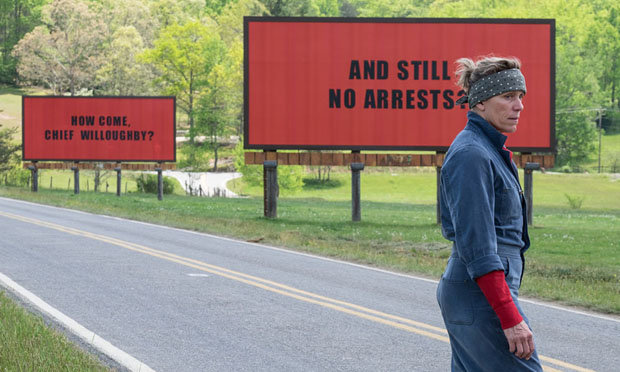Akin to watching a William Faulkner novel (albeit several decades late) being brought to life before your very eyes, Three Billboards Outside Ebbing, Missouri delivers in its poetic comeuppances, sharp-witted screenplay and conflicting characters. Straight to the point, this film expresses important messages of vengeance and forgiveness in an effective state of simplicity where its purpose is not lost in archaic script writing or romanticised tragedy.
As the acidic-tongued Mildred Hayes (Frances McDormand) grieves the rape, murder and posthumous mutilation of her daughter, she takes the initiative to speed up the work of the local police department in bringing to justice the man who harmed her daughter. Renting out three billboards and plastering them with a message to Chief Willoughby (Woody Harrelson) holding him to account, she causes a stir amongst the townspeople. McDormand’s commanding but problematic role both nurtures support and criticism from her audience; Hayes is not the film’s hero – in fact this is a film without protagonists or antagonists, simply people living.
Martin McDonagh’s screenplay nurtures caustic, black humour that not only lightens some of the film’s darkest moment but amplifies this apt picture of humanity in all its flaws. Nobody better both endears and infuriates than Sam Rockwell’s Officer Dixon – a performance that balances idiocy and ignorance with a child-like willingness to make something of himself. It seems that most characters, while questionable in their motives, are redeemable in some way and while MCDonagh’s writing ends on what would be an unsatisfactory note in any other film, the sheer craft of its writing is enough.
This is a film that acknowledges the cultural flaws of the Southern states and the personal transgressions of its characters and poses these problematics with the difficulty of sparking change. Encouraging reflection in its rawest form, Three Billboards both charms and outrages prolonging its themes far beyond the cinema screen.
Rose Crees
(Image courtesy of The Guardian)

